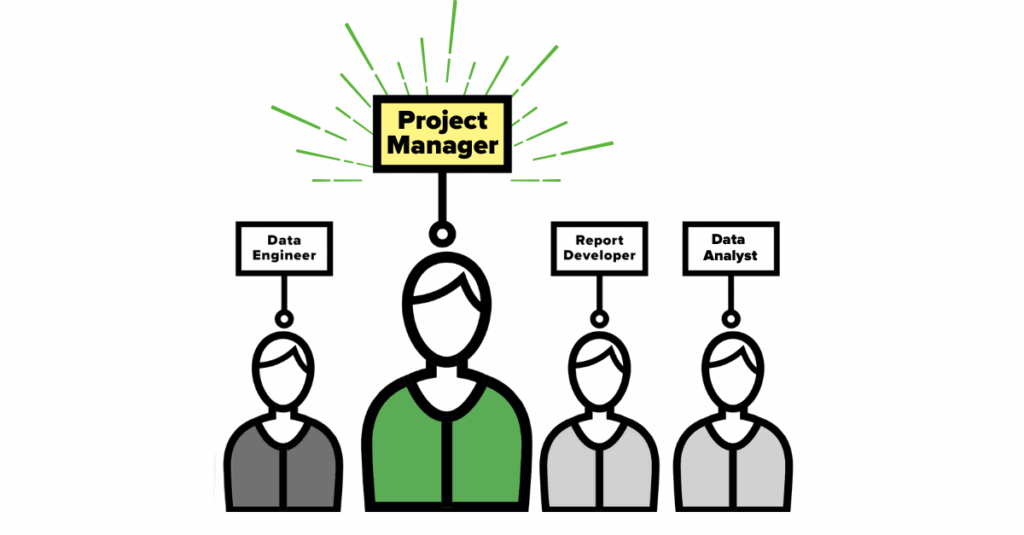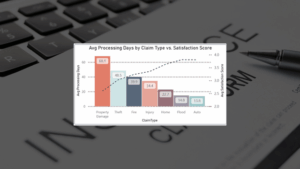New digital transformation and AI projects can come with a lot of flashy promises—but not all projects end up making it to the finish line. According to KPMG’s 2023 Technology Survey, after two years, 51% of the 400 surveyed US technology executives saw no performance or profitability gains from their digital transformation investments.
For new AI projects, the outlook is even more bleak. New research from S&P Global Market Intelligence reports “AI project failure rates are on the rise,” with 42% of businesses scrapping most of their AI initiatives, compared to only 17% from last year.
While a project manager (PM) alone can’t guarantee the success of a project, the right PM can dramatically enhance productivity, improve workflow efficiencies, and foster cross-team alignment and momentum. But what exactly does a project manager do to keep projects moving—and how to hire a good one?
This post covers what to consider before hiring a full-time project manager, including their main responsibilities, key characteristics to look for, interview questions to ask, and red flags to avoid.
What Does a Project Manager Do?
Of course, a project manager’s specific responsibilities vary depending on your organization’s industry, internal structure, and niche project goals. At LeapFrogBI our project managers are called “Delivery Managers” and are responsible for overseeing our client deliverables from beginning to end.
In other words, it’s their job to coordinate the “what” and “when” of work, leading a project from start to finish and ensuring successful outcomes measured by delivery speed, team performance, and stakeholder satisfaction.
Here’s a closer look at some of the main responsibilities of a project manager:
1. Define Project Goals, Scope, and Budget
To take a project from start to finish, a project manager must first begin by clearly outlining the objectives, deliverables, and scope of the project. It’s important they communicate expectations, milestones, and key deliverables to all project team members and relevant stakeholders.
At the same time, they need to closely manage budgets. It’s the project manager’s responsibility to establish and oversee the budget, manage costs proactively, and ensure resources are strategically used to avoid overruns. This can require a delicate balancing act as the project unfolds if unexpected changes arise or the scope changes.
2. Prepare Risk Management Strategies
No matter how detailed and carefully thought out the project timeline and scope, it’s almost inevitable that hiccups and challenges will occur along the way—and a good project manager should be primed and ready to handle them.
As a part of their planning, project managers must also prepare risk management strategies to anticipate problems and limit their impact. This includes proactively identifying potential risks and then developing contingency plans to respond promptly, reallocate budgets, and make adjustments as needed to quickly resolve issues with minimal disruption to project workflows, schedules, and budgets.
3. Facilitate Team Coordination and Communication
At the end of the day, overseeing schedules, budgets, and project deliverables means guiding and supporting different groups.
Depending on the structure of your business and the nature of your project, these groups can include diverse stakeholders and team members from developers and data engineers to business analysts and executives. It’s up to the project manager to ensure clear, consistent communication across teams, aligning expectations and sharing regular updates to maintain transparency and promote effective collaboration from project start to completion.
What Are the Characteristics of a Good Project Manager?
A good project manager should have strong soft skills, namely organizational abilities, communication expertise, and the ability to problem-solve and think quickly on their feet.
While these skills can sometimes be harder to quantify than more technical competencies, they’re the qualities that will make the difference between a mediocre project manager and a great one.
1. Strong Organizational Abilities
A project manager doesn’t necessarily have to have a type-A personality, but they should lead with strong organizational skills to keep projects on track and teams aligned.
Most importantly, this means being able to distinguish between urgent and critical responsibilities and less-important tasks to effectively prioritize tasks, determine timelines, and delegate responsibilities. At the same time, they should be able to deftly manage multiple deadlines, coordinate efforts across different projects, and adapt to shifting priorities.
Attention to detail is another key quality to look for in a project manager. For example, without proper documentation, essential details can be overlooked or forgotten, costing your organization time and resources.
2. Clear Communication and Interpersonal Skills
Naturally, to effectively manage stakeholder expectations and see projects and teams through challenges, changes, and milestones, project managers must have exceptional communication skills. Specifically, they need to be able to clearly convey project plans, report regular progress and project updates, and tailor messaging to different departments and stakeholders.
These interpersonal skills are key to maintaining cross-team alignment and ensuring transparency throughout the entire policy lifecycle so teams can collaborate effectively and adapt quickly to changes.
3. Proactive Problem-Solving Capabilities
Issue resolution and adaptive decision-making are inevitable parts of project management, which is why PMs should also maintain a keen focus on problem-solving and flexibility.
For example, a good project manager should be able to anticipate challenges and take initiative to proactively address roadblocks, promptly resolve issues, and get teams back on track when something goes wrong.
It’s also important they’re ready to pivot in the face of changing priorities, timelines, or other external disruptions. For example, if a new software integration fails, then a project manager should know how to quickly mobilize resources to troubleshoot issues and realign objectives to limit the impact on project timelines.
2 Main Challenges in Hiring a Project Manager
Finding the right project manager can significantly affect your teams’ productivity and project outcomes—not just for one project but for the long-term growth and success of your organization. With so much riding on hiring the right project manager, it can be difficult to sort through candidates and find the right fit for your business.
As you prepare the search for a project manager, pay attention to the two main challenges of hiring a full-time project manager:
1. High Market Demand
Project management is already an in-demand role-—and it’s only predicted to keep growing. According to the U.S. Bureau of Labor Statistics, the projected job outlook for project management specialists through 2023 is 7%, which is considered above average growth. Meanwhile, the new Global Project Management Talent Gap report from the Project Management Institute (PMI) reveals 30 million new project professionals will be needed to meet global demand by 2035.
Project complexity and the increasing emphasis on efficiency are largely responsible for the growing project management demand. But with a ripe market for job seekers, it can be harder for organizations to attract and retain top talent, particularly for small- to mid-sized businesses (SMBs) that have to compete with larger, deeper-pocketed companies for experienced professionals.
2. Culture Fit
With stiff competition for competent, experienced project managers, it can be tempting for organizations to scoop up the most qualified candidate they can find—but academic credentials and a flashy resumé aren’t the only things that matter when hiring a full-time project manager. It’s also important to find a candidate who’s the right cultural fit for your organization.
If your project manager is culturally misaligned, your organization can face communication challenges, interpersonal friction, and even reduced team morale. Most immediately, this can impact team performance and collaboration; down the line, it could even lead to project disruptions, higher turnover, and reputation damage that can undermine your organization’s long-term strategic goals.
3 Top Interview Questions to Ask When Hiring a Project Manager
Interviews alone don’t always give you the full picture of prospective candidates. To ease your search for a project manager and maximize your chance of finding a great fit, prepare strategic interview questions that reveal adaptability, problem-solving skills, and a knack for communication.
Here are three important interview questions to ask when hiring a project manager:
1. Can you describe a project you managed that didn’t go according to plan? How did you pivot?
Even if you hire the best project manager, inevitably, something will go wrong during the project lifecycle. This question gives candidates a chance to show how they react under pressure and use critical thinking to adjust strategies and realign resources where needed to keep projects on track and ensure successful outcomes.
Pay attention for calm and thoughtful responses that demonstrate adaptability and a creative mindset for problem-solving. For example, a strong candidate might describe when a critical team member unexpectedly left a project—and how they quickly reorganized responsibilities to course-correct and minimize project disruption.
2. How do you handle conflict within your project team?
Your organization may be a well-oiled machine, but it’s still normal for small conflicts to arise now and then. To maintain productivity and steer the project towards success, you need a PM who can identify conflict early, mediate disputes if needed, and use effective communication to restore collaborative relationships and team harmony.
Look for responses that signal empathy, active listening, and an inclusive approach to resolving disagreements—and watch out for rigid attitudes that might dismiss teammates’ concerns and leave tensions unresolved.
3. How to manage stakeholder expectations when project requirements or timelines change?
Projects rarely unfold exactly as planned. It’s up to the project manager to stay nimble, reassess priorities, and clearly communicate updates to keep up with evolving requirements and changing timelines.
This question helps you assess the candidate’s ability to navigate changes or conflicts diplomatically, communicate new priorities, and maintain both momentum and stakeholder trust when plans shift.
For example, look for responses that show confidence under pressure and an emphasis on collaboration. A transparent, stakeholder-focused approach to change management can indicate accountability and adaptability, while a more vague response may hint at uncertainty or poor planning under pressure.
3 Red Flags When Hiring a Project Manager
A project manager plays an important role in your organization, leading cross-functional teams, managing priorities, and juggling priorities to keep projects moving. It’s important they know how to not only manage resources strategically and optimize timelines, but also effectively communicate and collaborate across departments to align teams and drive project success.
Unfortunately, an impressive-looking resume doesn’t always translate to on-the-ground effectiveness. During interviews with prospective project managers, watch out for these red flags that could signal potential issues down the road:
1. Poor Communication
This is likely the most important red flag to watch for. If a candidate struggles to communicate clearly during the interview (especially when explaining past initiatives, decision-making processes, or project outcomes), then it’s a strong warning sign that they may not be able to lead teams or manage expectations effectively.
Remember, project managers need to be able to clearly articulate project needs, timelines, budget updates, and a host of other moving parts. Without the communication chops to share insights and guide team efforts, a project manager may create unnecessary confusion, slowing down or even derailing your entire project.
2. Lack of Relevant Experience
Most project managers have skills that are transferable across diverse industries, meaning they can quickly adapt and apply core skills to new environments—but relevant experience is still a keen advantage.
If a candidate has never worked in your industry or at least led similar projects, then there may be a steep learning curve to understand the nuances of your organization and specific project needs. This doesn’t mean they can’t succeed and prove themselves a strong project manager, but it may be harder for them to ramp up quickly and deliver value.
Watch out for responses that are too generic and surface-level, which can indicate a lack of industry familiarity and an inability to tailor their approach to your business’s unique goals.
3. Inflexibility
One of the most important traits of a strong project manager is agility. Without the ability to pivot under pressure and reprioritize, a PM can risk derailing timelines or missing key deliverables—and causing your entire project to fall behind schedule or even come to a halt.
During interviews, if a candidate seems overly attached to one way of doing things or unfamiliar with different tools or workflows, then it could be a sign they lack the flexibility and agility to operate effectively in fast-moving enviornments—a limitation that could mean slow progress and missed opportunities for your business down the road.
How Much Is a Project Manager Paid?
There are many factors that contribute to a project manager’s total compensation. For example, annual salaries can vary widely depending on the industry you’re in, where your business is located, the complexity of your projects, and the candidate’s level of experience and education.
Beyond base salary, total compensation can also include bonuses, remote work flexibility, paid time off, stock options, and other perks. But according to ZipRecruiter, the national average salary for a project manager is about $103,000.
Why Is It Hard to Find a Good Project Manager?
Even if you have a huge line-up of resumes in your inbox, it’s not always easy to find a good project manager. The role requires leadership, communication, organization, and strategic-thinking skills—soft skills that can be hard to quantify compared to technical credentials.
Still, even (or especially) in the digital and now AI age, new analysis from Aura Intelligence proves that communication remains the “most in-demand” skill among employers. After all, a project manager doesn’t just manage tasks; they manage people, priorities, and expectations.
The hiring process is made even more challenging by stiff market competition. This is especially true for SMBs that may not have as many perks or as big salaries to offer as bigger companies vying for the same top project management talent.
What Happens If You Hire the Wrong Project Manager?
“Project manager” may sound like a vague title, but make no mistake: The right project manager can make or break your project outcomes and the ultimate trajectory of your organization’s success.
If you end up hiring a full-time project manager who’s not the right fit for your organization’s needs, you risk:
- Delayed or Failed Projects: Poor leadership, disorganization, and a lack of strategic direction can lead to missed deadlines or even incomplete deliverables. This is common if your project manager sets unrealistic timelines, fails to adapt to scope changes, or struggles to respond to unexpected delays or other roadblocks.
- Budget Overruns: An ineffective project manager may lack the discipline or foresight needed to properly manage budgets. This can lead to overspending, misallocated resources, or last-minute costs that weren’t accounted for in initial planning. Unfortunately, over time, even small budgeting hiccups can add up to significant financial strain for your organization.
- Increased Turnover: Project management sets the tone for team dynamics. Without strong communication skills, emotional intelligence, and an ability to foster organization and collaboration, a project manager can create confusion at best and friction at worst. Left unmanaged, this can weaken morale and cause your organization to lose high-performing team members who become disillusioned by poor project management.
Consider Hiring a Fractional Data Team Instead of a Project Manager
Project managers play a pivotal role in helping your organization deliver work on time, on budget, and in alignment with your overall strategic goals. But for many SMBs, hiring a full-time, in-house project manager is simply too expensive or operationally burdensome.
With project management skills increasingly in demand, it’s getting even harder for SMBs to shell out the resources needed to attract and retain top talent—but hiring full-time isn’t your only option.
When you work with our fractional data team, a Delivery Manager is assigned along with a suite of other data team professionals. For example, in addition to a project manager, your organization can work with a data analyst, data architect, data engineer, and business analyst. Together, this team of specialists can give you project management skills, technical depth, hands-on support—without the financial, administrative, or operational burden of onboarding, training, and retaining full-time employees.
Plus, a fractional data team gives you the flexibility to scale what you need—and eliminate what you don’t.
Before committing to a full-time project manager for your data projects, consider the benefits of working with a fractional data team and how it can help your business move faster and achieve more with less.








